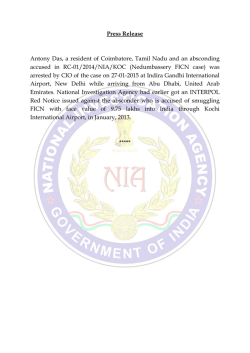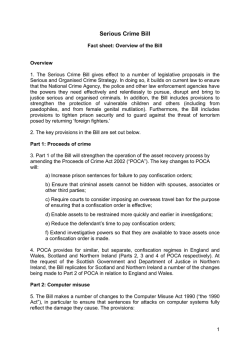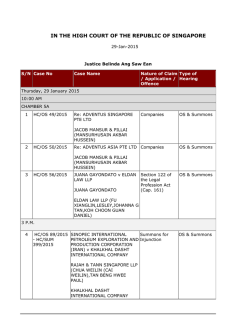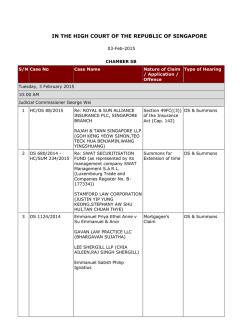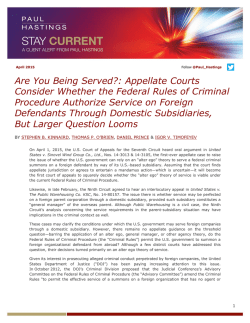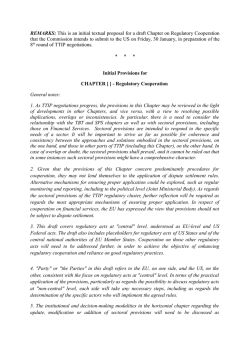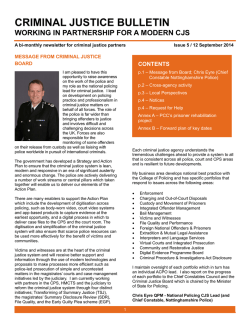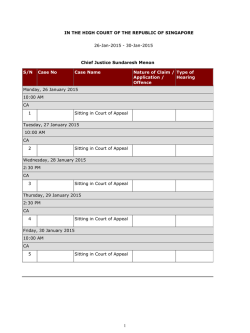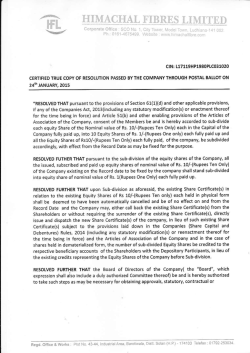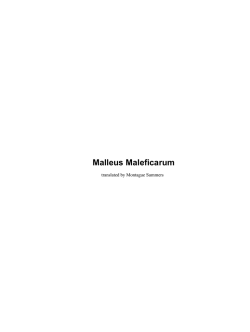
PAPER ON THE TOPIC OF PROVISIONS TO CURTAIL DELAY IN
1 PAPER ON THE TOPIC OF PROVISIONS TO CURTAIL DELAY IN DECIDING CRIMINAL MATTERS Article 21 of the Constitution of India provides guarantee of protection of life and personal liberty. When a person is charged for an offence punishable under law, his life and personal safety is curtailed. The Hon'ble Supreme Court has observed in the case of Hussaineara Khatoon v. Home Secretary, State of Bihar, AIR 1979 SC 1377 that right to life under Article 21 includes right to speedy trial, only through which right to life can be attained. 2] Legislature has time and again made several amendments to the Code of Criminal Procedure with the following object ; (i) an accused person should get a fair trial in accordance with the accepted principles of natural justice; (ii) every effort should be made to avoid delay in investigation and trial which is harmful not only to the individuals involved but also to society; and (iii) the procedure should not be complicated and should, to the utmost extent possible, ensure fair deal to the poorer sections of the community. 3] To safeguard the the right guaranteed by Article 21 of the Constitution various provisions were inserted in Code of Criminal Procedure. The code was given a new shape in the year 1973 by way repealing the old Code of 1898. The Code of 1973 accommodated various recommendations made by the Law Commission of India with a view to simplify the procedure for speedy trial of criminal cases. Those provisions of the Code of Criminal Procedure are discussed in this paper 2 Provisions Relating to Summons : 4] Section 62 to 69 of the Code prescribe various modes of service of summons and also provide by whom the summons can be served. Section 87 of the Code empowers the court to issue a warrant in lieu of or in addition to a summons after recording reasons in writing. Section 82 and 83 of the Code empowers the court to issue proclamation, attachment and sale of the property of accused. The provisions are to be effectively implemented with purpose to compel the presence of accused. 5] The provisions under Section 206 of the Code can also be invoked while dealing with cases involving petty offence. In view of this provision, the Court can issue summons to the accused requiring him either to appear in person or by pleader on a specified date, or if he desires to plead guilty to the charge without appearing before the magistrate, to transmit before the specified date, by post or by messenger, the said plea in writing and the amount of fine specified in the summons or if he desires to appear by pleader and to plead guilty to the charge through such pleader, to authorise in writing, the pleader to plead guilty to the charge on his behalf and to pay the find through such pleader. Provision to Curtail Unnecessary Adjournment : 6] As per Section 309 of Criminal Procedure Code, the Court should not grant adjournment in a routine manner, but only in very rare and extraordinary circumstances and for special reasons. This Section does not provide for indefinite adjournment of a case. The policy of the criminal law is to bring persons accused to justice as speedily as possible. No procedure which does not ensure reasonable quick trial, can be 3 regarded as 'reasonable, fair or just'. The speedy trial means reasonable, expeditious trial which is an integral and essential part of the fundamental right to life and liberty. If the trial against the accused is not concluded within a reasonable time, it amounts to violation of right of speedy trial guaranteed to him under Article 21 of the Constitution. So also if the prosecution is kept pending for an indefinite period, important evidence may be obliterated by more lapse of time and it may not be available at the time of trial. 7] In case of Rajdeo Sharma v. State of Bihar reported in AIR 1998 (Supreme Court ) page 3281, it was observed that : ''Only in very exceptional cases which are to be recorded, the Court can grant further time to the prosecution to adduce evidence. Only if the delay is caused because of the conduct of the accused, then the Court is not bound to close the evidence.'' In case of State Vs.Rasiklal K. Mehta, 1978 Cr.L.J.809(Bom) it is observed that, “ In so far as inquiries and trials are concerned, the Cr.P.C. in express terms directs that the proceedings must be held as expeditiously as possible and in particular, when the examination of witnesses has begun, it must be continued from day to day unless adjournment is considered necessary for reasons to be recorded. It is the cardinal principle of criminal jurisprudence that criminal prosecution should be disposed of without any avoidable delay and as expeditiously as possible. The object is to avoid loss of evidence by passage of time and unnecessary harassment to the accused.” Hon'ble Apex Court in the case of State of U.P. vs. Shambhu Nath Singh (A.I.R. 2001 S.C. 1403) observed, “It is a sad plight in the trial courts that witnesses who are called through summons or other processes stand at doorstep from morning till evening 4 only to be told at the end of the day that the case is adjourned to another day. This primitive practice must be reformed by the presiding officers of the trial courts and it can be reformed by everyone provided the presiding officer concerned has a commitment towards duty.” Provisions to Curtail Evidence: 8] During the trial the important provision which can play a vital role to reduce the quantity of evidence is under Section 294 of the Code. Where any document is filed before any court by the prosecution or the accused, the particulars of every such document shall be included in a list and the prosecution or the accused, as the case may be shall be called upon to admit or deny the genuineness of each such documents. Where the genuineness of any document is not disputed, such document may be read in evidence in any enquiry, trial or other proceedings under this Code without proof of the signature of the person to whom it purports to be signed. The invocation of this provision can help to reduce evidence of the documents not in dispute. The list of document is to be furnished in proforma as prescribed under Chapter VI , Para32 of the Criminal Manual. Hon'ble Bombay High Court, Bench at Nagpur in recent Confirmation case 1/2013 State of Maharashtra through P.S.O. Gadge nagar,Amravati vs.Ajay Dayaram Gopnarayan, Achalpur decided on 17012014 emphasised use of the prescribed proforma for admission and denial of genuineness of the documents as envisaged under Section 294 of the Code. Provisions Relating to Recording of Evidence When accused is Absent : 9] Section 273 of the Code provides that all evidence taken in 5 the course of the trial or other proceeding shall be taken in the presence of the accused, or when his personal attendance is dispensed with, in the presence of his pleader. Presence of accused in number of cases pertaining to under trial prisoners could not be secured due to inability of police machinery out of their official exigencies. The trials get protracted and witnesses go unexamined which counts as a major cause for the delay in trial. In view of the provisions under Information Technology Act, the term,“electronic record” has made major ramifications in such procedural difficulties. The evidence in such situation can be recorded by effective use of videoconferencing. The evidence of witnesses placed at a far distance can also be recorded by such means. The very purpose is to record the evidence without any delay. Whenever it appears to a court that the examination of a witness is necessary for the ends of justice, and that the attendance of such witness cannot be procured without an amount of delay, the court may dispense with such attendance and may issue a commission for the examination of the witness in accordance with Section 284 of the Code. 10] During the course of the trial absence of accused or persistent disturbance in the proceedings by him cannot be ground to protract the trial. Under Section 317 of the Code the magistrate may, if the accused is represented by a pleader, dispense with the attendance of such accused and proceed with the enquiry or trial in his absence, and may, at any subsequent stage of the proceedings, direct the personal attendance of such accused. If the accused in any such case is not represented by a pleader, or if the magistrate considers his personal attendance necessary, he may, if he thinks fit and for reasons to be recorded ordered that the case of such accused be taken up or tried separately. 6 11] In the case of M/s Bhaskar Industries Ltd V/s M/s Bhiwani Derim and others, AIR 2001 SC 3625 the Hon'ble Apex court observed that, “It is within the powers of magistrates and in his judicial discreation to dispense with the personal appearance of an accused at any particular stage in a summons case. where accused represented by pleader [Sub section (1)] It is only if the Judge or Magistrate is satisfied that (1) the personal attendance of the accused before him is not necessary in the interests of justice or (2) the accused persistently disturbs the proceedings, then where he is represented by a pleader his personal attendance may be dispensed with. In a summons case, such as one involving an offence u/s. 138 of the Negotiable Instruments Act, 1881, if it appears to the Court that personal attendance could result in enormous hardship and cost to the accused, the Court may dispense with his personal attendance either throughout or at any particular stage of the trial, after taking an undertaking from him that he would not dispute his identity as the particular accused in the case and that a counsel on his behalf would be present in Court and he would have no objection in the taking of evidence in his absence. The main concern of the Court is administration of criminal justice and for that purpose the Court proceedings should register progress. Discretion to dispense with the personal attendance should be exercised in rare cases due to distance or section 317.” Provisions When Complainant Remains Absent : 12] Absence of complainant is one of the cause which may add to the delay in proceeding. In trial of warrant cases instituted otherwise than 7 on a police report if the complainant is absent on the day fixed for the hearing of the case and the offence may be lawfully compounded or is not a cognizable offence the magistrate may discharge the accused under Section 249 of the Code. In trial of summons cases by magistrate, the magistrate shall on absence of complainant, acquit the accused under Section 256 of the Code. Compounding of Offences : 13] Section 320 of the Code empowers the Court to compound the offences punishable under the sections of Indian Penal Code as specified in tables appended. When any offence is compoundable under Section 320, the abetment of such offence or an attempt to commit such offence(when such attempt is itself an offence) may be compounded. The recourse to alternate dispute resolution mechanism is not foreign to the criminal offences compoundable under Section 320 of the Code. Parties may be referred for settlement of the criminal matter if it pertains to offence under Negotiable Instruments Act. The criminal offences pertaining to matrimonial dispute can also be referred for settlement. However, the recourse after settlement of such dispute for commission of offence under Section 498A I.P.C. is only to file petition to quash the F.I.R. before Hon'ble High Court. Provisions Relating to Stopping of Further Investigation: 14] Section 167 (5) of the Code of Criminal Procedure deals with stopping further investigation of summons cases. If a accused is arrested in summons case and the investigation is not completed within six months then the Magistrate before whom the case is pending is statutorily oblige to make an order of stopping further investigation into the offence 8 unless the officer making the investigation by application satisfies the Magistrate that the continuation of the investigation beyond the period of six months is necessary. Provisions Relating Stopping of Proceeding : 15] Sec. 258 of Cr.P.C. is one of the section which can be brought into aid to effectuate the right to seedy trial. The section enables the Magistrate to stop the proceeding in the summons case instituted otherwise than upon complainant. The section empowers the Magistrate to stop proceedings at any stage without pronouncing any judgment and where such stoppage is made after the evidence of the principal witnesses has been recorded, pronounce a judgment of acquittal. The Magistrate is obliged to specify reasons as to why he opts to do so. Provisions Relating to Plea Bargaining : 16] Chapter XXIA this Chapter deals with the provisions of plea bargaining. Plea bargaining Chapter permitted an accused to settle the offence punishable upto seven years imprisonment with certain limitation in which Chapter of plea bargaining has not been linked with section 320 of Cr.P.C. which permits compounding of certain offences. The provisions of plea bargaining chapter are pari materia to the existing section 320 of Cr.P.C., which also permits settlement and compounding of offences sans prison term. In the existing section 320 of Cr.P.C. also any offences, enumerated under subsection (2) are allowed to be compounded with the permission of the Court. The basic difference in section 320 of Cr.P.C. and the new Chapter of 'Plea Bargaining' is that in the former provision the parties could settle the offence outside the Court mutually and in the Chapter the settlement has to be made with prior permission of the Court. 9 17] True spirit of 'plea bargaining' is depend flexibility in the bargaining power of the accused persons and the question of imposing substantive punishment should be left to the Court in appropriate cases. To check the misuse of power by the trial Courts the settlement can be made justifiable in a restrictive way by the superior Courts on the motion by either party. 18] The plea bargaining Section 265A to 265L of Cr.P.C. helps the Court and State to manage the case loads. The system gives a greater relief to a large number of under trials lodged in various jails of the country and helps reduce the long pendency in the court and also curtailing delay in trial. Provisions in Criminal Manual Relating to Judicial Business: 19] In ChapterIII of Criminal Manual following guidelines have been given to Judicial Officers by Hon'ble High Court while discharging their judicial business : “ (1) Magistrates should remember that priority should, as a rule, be given to criminal work over other work, and that every effort should be made to reduce, as far as possible, the hardship to parties and witnesses which the proceedings entail. (2) The Magistrates should settle their Boards personally and should not leave it to be done by their Bench Clerks. The Boards should be settled so as to have, as far as possible, only such number of matters as will occupy the whole day, after making allowance for the fact that some matters are likely to be adjourned owing to the absence of parties or their witnesses or for some other reason. The Magistrates should, however, see that 10 too many cases are not put on the Board, as this would cause unnecessary inconvenience and harassment to the parties. (3) The Magistrate should always sit punctually at the appointed hour so as not to keep people waiting. If the Magistrate finds that, owing to his absence from the Court or his being busy with other cases, it is not possible for him to hear any case on the day fixed for its hearing, he should, so far as possible, intimate to the parties in advance, so that parties and witnesses do not have to attend the Court unnecessarily. Though no hard and fast rule may be laid down regarding the precedence in hearing cases, it would be useful to bear the following principles in mind : (i) Cases in which Juvenile Offenders are involved should normally be disposed of with the utmost expedition and as soon as possible after the Offender is brought before the Magistrate. (ii) Custody cases should take precedence over non custody cases. (iii) Cases in which Government servants are involved should be dealt with as expeditiously as possible. (iv) Cases under the Indian Railways Act, and other petty noncognizable cases, should be disposed of as soon as possible after the accused is produced before the Court. (v) Partheard cases and cases which are standing over from previous dates of hearing should take precedence over the cases to be heard for the first time. (vi) Cases in which parties and witnesses come from a distance should as far as possible, be given due preference. (vii) The following cases should be disposed of as expeditiously as possible. 11 (1) 1955. (2) Cases under the Protection of Civil Rights Act, Cases under Essential Commodities Act. (3) Cases under the Bombay Shops and Establishments Act, 1948. (4) Cases of Riot & Communal Disturbances. (5) Cases relating to Economic offences. (6) Cases of reckless and dangerous driving under the influence of liquor etc.. (7) Applications for grant of maintenance filed under Section 125 of the Code of Criminal Procedure, 1973. ” Summary Trial in Cases Under Section 138 of the Negotiable Instruments Act : 20] Hon'ble Apex Court in reported case Indian Bank Association and others Vs. Union of India and others Writ Petition(Civil) No.18 of 2013 observed that “We have indicated that under Section 145 of the Act, the complainant can give his evidence by way of an affidavit and such affidavit shall be read in evidence in any inquiry, trial or other proceedings in the Court, which makes it clear that a complainant is not required to examine himself twice i.e.one after filing the complaint and one after summoning of the accused. Affidavit and the documents filed by the complainant along with complaint for taking cognizance of the offence are good enough to be read in evidence at both the stages i.e.presummoning stage and the post summoning stage. In other words, there is no necessity to recall and reexamine the complaint after summoning of accused, unless the Magistrate passes a specific order as 12 to why the complainant is to be recalled. Such an order is to be passed on an application made by the accused or under Section 145(2) of the Act suo motu by the Court. In summary trial, after the accused is summoned, his plea is to be recorded under Section 263(g) Cr.P.C.and his examination, if any, can be done by a Magistrate and a finding can be given by the Court under Section 263(h) Cr.P.C.and the same procedure can be followed by a Magistrate for offence of dishonour of cheque since offence under Section 138 of the Act is a document based offence. We make it clear that if the proviso (a), (b) & (c) to Section 138 of the Act are shown to have been complied with, technically the commission of the offence stands completed and it is for the accused to show that no offence could have been committed by him for specific reasons and defences.” 21] These are the various provisions with the help of which delay in criminal trial can be curtailed. It is a well known fact that “Justice delayed is justice denied”. Thus, to ensure a speedy trial and provide for right to life enshrined in our fundamental rights effective use of above mentioned provisions under the Code should be made. 13
© Copyright 2026
